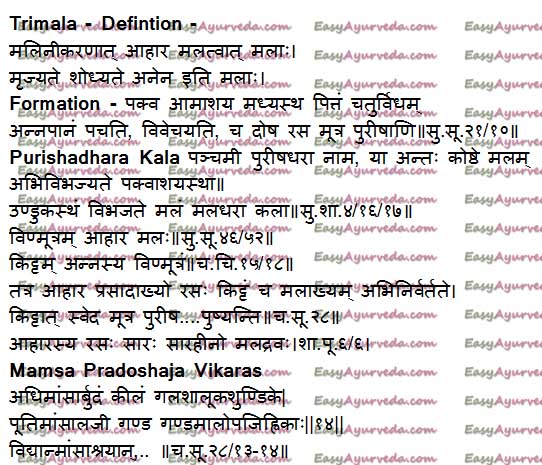Tri Malas – The Three Major Waste Matters Of Body
Article by Dr Raghuram Y.S. MD (Ay) & Dr Manasa, B.A.M.S
Table of Contents
Introduction
As per Ayurveda, waste matters of the body are as important as body tissues for maintenance of good health and longevity. Ayurveda explains specific functions of these waste matters.
The three Doshas, seven body tissues and 3 types of waste matters in the body – these 13 form the structural and functional components of the body. They support the body functions and contribute to health in their own ways.
Tridoshas – the three doshas which are majorly the functional components of the body. They are –
- Vata,
- Pitta and
- Kapha
By definition they are chief contaminants of the body. But in a state of balance i.e. equilibrium, they take care of all the functions of the body. They cause diseases only when they get vitiated.
Sapta Dhatus – the seven tissues of the body which are chiefly the structural components of the body. They are –
- Rasa – Lymph, plasma
- Rakta – blood
- Mamsa – muscles
- Meda – fat, adipose tissue
- Asthi – bones
- Majja – bone marrow
- Shukra – semen
They make most of the structural anatomy of our body. Their balance is a pointer of good health and immunity. When they get weak they are susceptible to be attacked and damaged by the vitiated doshas. This leads to many diseases.
Tri Malas
The three major excreta of the body which are the waste products of metabolism. They are –
- Pureesha – stools
- Mutra – urine
- Sweda – sweat
These three are formed on daily basis and keep the body healthy and fit by getting excreted out of the body at proper time and in right quantity. If they remain in the body they would cause many diseases.

Mala definition, meaning
Definition and meaning of mala
Those which pollute other components of the body are called malas, being themselves the waste products of the food.
Those which bring about purification of the body after getting expelled from the body are called malas.
Trimala importance
Importance of Trimala – 3 waste material in the body – in a nutshell
Now, when the excreta are neither the structural components nor the functional components of the body, in fact are the waste materials of the body, we get a doubt about their role in the body and contribution towards comprehensive health. We shall discuss about the same in the coming passages.
The excreta contribute towards good health by getting eliminated in time – For the body to enjoy its health, the excreta should be thrown out of the body in right proportions and in right time. Malas are like noisy students of the classroom. They can help the class by being out of the class. If they are in, they disturb the whole learning environment. The same is the case with the excreta. When they go out, they keep the body healthy.
They also keep the mind and senses pleasant and healthy. We can imagine the status of the person who has constipation or urinary obstructionof the urinary bladder as in benign prostate hypertrophy etc. They are physically upset, at the same time, their mind and senses too are disturbed.
The excreta when stagnated in the body disturb all functions and causes diseases – when these three major excreta gets stagnated in the body or get excreted in deficit amounts, they get vitiated and produce many health problems. The vayu gets vitiated. In turn the vayu moves haphazardly in opposite and non-desirous directions.
The pitta and kapha are disturbed and replaced. The pressure shifts to the upper parts of the body i.e. belly and chest organs and later to the head, brain and sense organs. Many diseases are produced therein. Metabolism and various other activities like circulation, respiration etc are put in pressure and are disturbed.
Excreta which has got retained in the body imparts pressure and causes blocks on the channels of transport in the body – the excreta blocked in the body will impart pressure on many channels and ducts and prevent the smooth functioning of the body, be it circulation, respiration or excretion.
This leads to deficit nutrition and aeration in the body, the body toxins will not be thrown out and the body will become a victim of many diseases.
The excreta provide strength and endurance to the body – In certain diseases like Rajayakshma / Kshaya i.e. tuberculosis, phthisis, wasting diseases, the excreta is said to be bala i.e. strength to the body. Ayurveda advocates utmost precaution to be taken during the treatment of this disease. In treatment of rajayakshma the physician should take care to protect and conserve the mala, especially feces in the body. Medicines which evacuate bowel and throw out excreta should not be administered. Since everything which is consumed is converted into feces in this disease, the feces itself guards the body by providing the strength. When excreta are thrown out in excess, it poses threat to the life.
It is said ‘Shukrayattam balam pumsaam, malayattam tu jeevitam…’ which means ‘the balance of semen provides strength to a person and the balance of excreta will guard one’s life’.
The excreta contaminated by the doshas will lead to diseases – the tissues and excreta together are called as dushyas i.e. the components of the body which tend to be contaminated by doshas. Thus, feces, urine and sweat too are contaminated by doshas. When this happens, these contaminated excreta produce certain diseases called mala pradoshaja rogas.
The contamination or blocks in channels excreting the excreta will cause diseases pertaining to those excreta – Each excreta will have its channels of excretion, which carry them, they are called mala vaha srotas. The passages for excretion of feces is called pureeshavaha srotas, those which form and void urine are called mutravaha srotas and those which cause sweating are called swedavaha srotas. When these channels are contaminated diseases like constipation, diarrhea, dysentery, diabetes, dysuria, excessive or deficit sweating, skin diseases etc are formed.
Pathological increase and decrease of excreta too will cause diseases – the excreta should be maintained in a balanced state in terms of its formation and excretion. They should be maintained in normal quality, quantity and consistency. When the quantity of feces, urine and sweat exceed or decrease beyond normal limits they lead to various diseases.
Other significant points
Other significant points about waste matters:
Malas, along with the tissues and doshas are considered as the mulas i.e. roots of the human body. The body is formed and maintained by their balance.
‘Sama mala kriya’ i.e. proper elimination of excreta is one of the signs of proper health i.e. swasthya lakshana.
The doshas and tissues too, when imbalanced are called malas because they tend to contaminate the body, cause damage and diseases. Thus, the term mala is interchangeably used for doshas, dhatus and malas.
The pitta located in between pakwashaya i.e. colon and amashaya i.e. stomach segregates the food which we consume into dosha, rasa i.e. essence of digestion or food juices, urine and feces. (Su.Su.15/4)
There is also a reference that the maladhara kala i.e. the membranes and layers which hold, form and classify the excreta is located in the pakwashaya i.e. colon. Thus, purishadhara kala is the functional component of formation and segregation of excreta. (Su.Sha.4/16)
Feces and Mutra i.e. urine are said to be excreta derived after the useful part of digested food has been segregated. They are called ahara mala. (Su.Su.46 & Cha.Chi.15/18)
The useful part of the food which nourishes the body are called rasa. The waste part of the food derived after digestion of food is called kitta or mala. The excreta nourish sweat, urine and stools. This also gives a reference that the sweat is also a excreta produced from metabolism or digestion of food. Sweat is also excreta of meda i.e. fat tissue. It is formed during fat metabolism. (Cha.Su.28)
The rasa dhatu formed after digestion carries ahara sara i.e. essence of food. The excreta are devoid of this essence of food. (Sha.Pu.6/6)
Forcible suppression of the urge of defecation and urination will cause diseases related to the vega dharana or controlled urges. They are called pureesha vega avarodhajanya rogas and mutra vegavarodha janya rogas respectively. They are also types and causes of udavarta i.e. abnormal movement of vayu.
The small quantities of excreta formed as an effect of tissue metabolism are called dhatu mala or sukshma mala.
Related reading – Dhatu Mala
Importance of its knowledge
Benefits of having the knowledge of Malas
For a physician it is very important to have the knowledge about the excreta of the body because –
Its quality and quantity of formation helps in knowing if they are in balance or out of balance.
The knowledge of mala pradoshaja and diseases caused due to contamination of malavaha srotas helps in understanding the pathology properly and also treating them comprehensively.
The knowledge of malas will help the physician to make right medicinal choices to expel the accumulated excreta and also to conserve the excreta when they are lost in excess.
The knowledge of malas will help the physician to balance the excreta and to save life and conserve the energy of the patient in diseases like Rajayakshma.
Click to Consult Dr Raghuram Y.S. MD (Ayu) – Email / Skype








